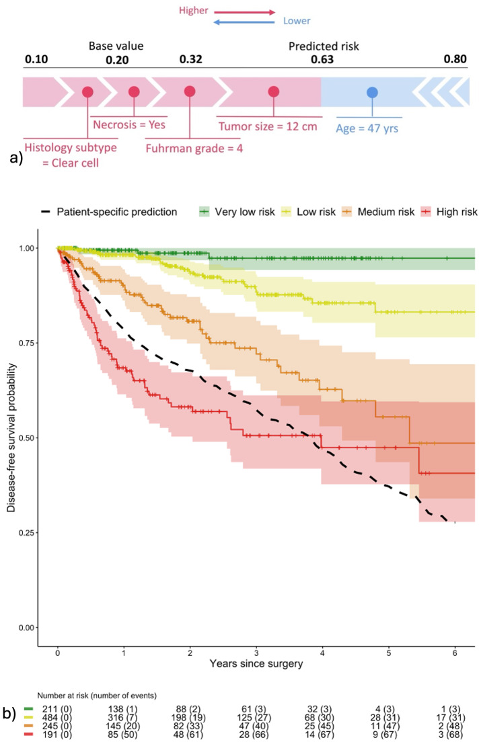(UroToday.com) The 2024 European Association of Urology (EAU) annual meeting featured a kidney cancer rapid fire debate, and a presentation by Dr. Laurence Albiges discussing that no we should not be treating all pT3a grade IV/N0 patients after nephrectomy with adjuvant immunotherapy. Dr. Albiges started her presentation by emphasizing that not one size fits all for adjuvant therapy in kidney cancer:
- There is diversity in pT3a outcomes
- We need to do better in risk assessment – perhaps this is an opportunity for artificial intelligence?
- We need to do better with biomarker assessments
- Perhaps we can improve by using minimal residual disease as a biomarker
With regards to improving on risk assessment with artificial intelligence, Dr. Albiges notes that UroPredict has been developed with machine learning to assess real-world data for predicting recurrence in kidney cancer.1 The machine learning pipeline is as follows:

This study used the French kidney cancer research network database, UroCCR, to analyze a cohort of surgically treated RCC patients. The best results in predicting disease free survival were achieved using Cox proportional hazard models that included 24 variables, resulting in an iAUC of 0.81 (95% CI 0.77-0.85). Importantly, the machine learning model surpassed the predictive performance of the most commonly used risk scores while handling incomplete data in predictors. Furthermore, patients were stratified into four prognostic groups with good discrimination (iAUC 0.79, 95% CI 0.74-0.83):

In the real world, this artificial intelligence model would be able to depict clear cell RCC patients who are eligible according to KEYNOTE-564 criteria and those who are not eligible:

Perhaps we are able to better risk stratify patients using the biomarker of PD-L1 expression. In the KEYNOTE-564 trial2 assessing outcomes by PD-L1 status, those with PD-L1 >=1 had a significant benefit with utilization of adjuvant pembrolizumab (HR 0.68, 95% CI 0.55-0.85), whereas those with PD-L1 <= 1% did not (HR 0.91, 95% CI 0.58-1.44):

Finally, Dr. Albiges concluded her presentation by noting that the biomarker of minimal residual disease, used in urothelial carcinoma based on ctDNA, has shown prognostic outcomes in the urothelial carcinoma disease space:

She emphasized that we should stay tuned, as ctDNA data will be coming to RCC very soon.
Presented by: Laurence Albiges, MD, PhD, Gustave Roussy, Villejuif, France
Written by: Zachary Klaassen, MD, MSc – Urologic Oncologist, Associate Professor of Urology, Georgia Cancer Center, Wellstar MCG Health, @zklaassen_md on Twitter during the 2024 European Association of Urology (EAU) annual congress, Paris, France, April 5th - April 8th, 2024
References:
- Margue G, Ferrer L, Etchepare G, et al. UroPredict: Maching learning model on real-world data for prediction of kidney cancer recurrence (UroCCR-120). NPJ Precis Oncol. 2024 Feb 23;8(1):45.
- Choueiri TK, Tomczak P, Park SH, et al. Adjuvant Pembrolizumab after Nephrectomy in Renal-Cell Carcinoma. N Engl J Med. 2021 Aug 19;385(8):683-694.


